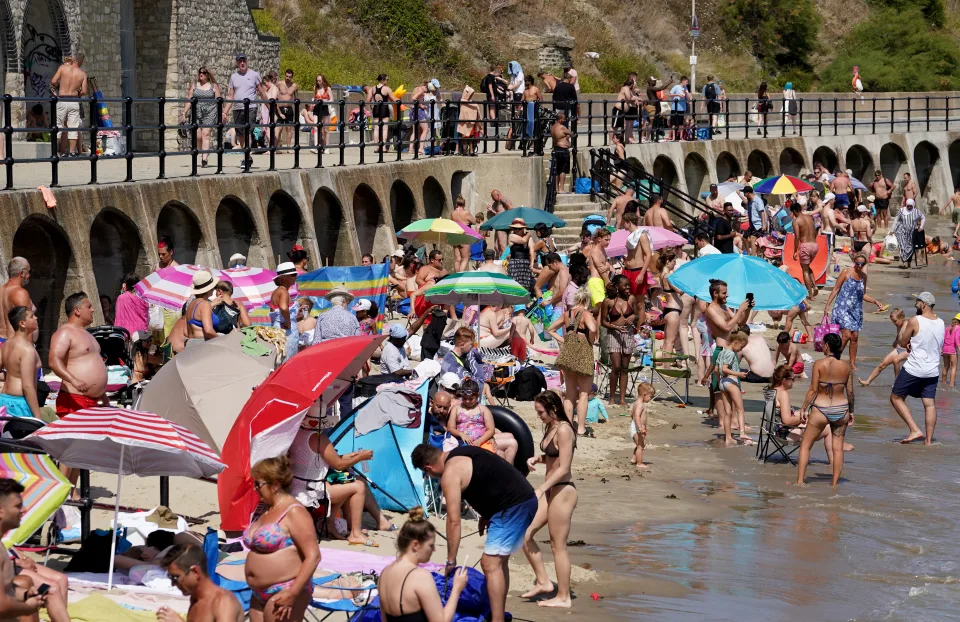Etymologising* in the heat of the moment

On July 11 2022 the temperature in London was 32 degrees, hotter than the notorious summer of 1976. By the 19th it had risen to a record-breaking 39 degrees, at which point I, who had mocked the complainers and declared my preference for extreme temperatures, collapsed. On a restorative stroll across the Surrey Hills five days later I could see the wildfires burning in the distance.
For the last two months on social media the hashtag #heatwaveuk has dominated the conversation. ‘Heat wave’ was first used in 1893 to describe a weather phenomenon. Noun and verb heat are descendants of Old English hætu, hæto – heat, warmth, ardor – from Proto-Germanic *haita, source also of the Old English adjective hat, hot. The ancient, pre-Germanic ancestor of these key words is unknown, although I suspect it was also the ancestor of the Greek kaiein and Lithuanian kaisti, both meaning to burn.

As folklorist Tatiana Fajardo had reminded me on a 31-degree July 17, the dog days are the hot, sultry days of summer. They were the period following the heliacal rising of the star system Sirius (known as the ‘Dog Star’), which Hellenistic astrology associated with heat, drought, lethargy, fever, & bad luck. ‘Sultry’ incidentally was first recorded in the late 15th century and is a variant form of the older swelter, to suffer discomfort from the effects of heat, itself deriving ultimately from an Old English verb meaning both to die and to burn, probably from a ProtoIndoEuropean root *swel in the sense of shine or beam.
(The French term for a period of dangerous heat, canicule, can also denote a seasonal bout of listlessness and indolence, coming as it does from Latin canicula, an affectionate diminutive of canis, dog, used of Sirius, the Dog Star.)
During this year’s dog days it has sometimes been muggy and close here in overcast suburbia. ‘Muggy’ – uncomfortably warm, humid was first recorded in 1746. It derives from rural dialect ‘mug’, mist or drizzle, via the archaic Middle English verb ‘mugen’, from Old Norse mugga, ultimately from ProtoIndoEuropean *meug- slimy, slippery.
Despite some occasional humidity we have had virtually no rain at all in July and so far in August. The ground is parched. Of uncertain origin, ‘parch’ – a verb meaning to dry by excessive heat – appeared in the 1400s referring to drying or roasting (nuts or vegetables for example). In spite of the surface resemblances it probably does not derive from either ‘perish’ or the Latin word persiccare – to dry thoroughly, which is related to dessicate. Parch is also unrelated to ‘parchment’ which came via French from a blend of Latin pergamina – writing material from Pergamum – and Parthika Pellis – scarlet leather from Parthia.
By the first week of August the authorities were imposing hosepipe bans in some areas, and the alarming lack of reservoir water was becoming apparent. A state of drought was officially declared for South, Central and Eastern England on August 12. The word derives from Old English drugaþ, drugoþ, from Proto-Germanic *drugothaz, noun form of adjective *dreug, dry. Chaucer used it in the Middle English form ‘droghte’ and ‘drouth’ was a variant form which has survived in some dialects.
In engaging in hot weather banter, those of us of a certain age are likely to reference the much-quoted tabloid headline of summers past (mocked and endlessly replicated, and possibly actually invented by Private Eye magazine) ‘Phew What a Scorcher!’ or the Fast Show’s 1994 comedy catchphrase ‘Scorchio!’ Scorch was first thought to be related to Old French escorchier – to strip off the skin – from Vulgar Latin *excorticare to flay, but is nowadays usually derived from Middle English ‘scorchen’ or ‘scorcnen’ (to make dry, singe), probably an alteration of the Old Norse *scorpnen – to be shrivelled.

The Mirror‘s ‘Blowtorch Britain’ is a slightly more original take on ‘Tinderbox Britain’, a standard scare headline in these conditions, and for once, after the driest July since 1836, we can forgive the tabloids their perennial overexcited comparisons; ‘Hotter than Corfu!/Tenerife!/Honolulu!/Ibiza!’, ‘Hotter than the Sahara!’

At the humid, warm end of August my friend Grace Tierney looked at the origins of some other weather and climate descriptions…
*If you are searching for word origins and histories – etymologies – online, the well-known dictionary sites are not necessarily the best sources. I recommend https://www.etymonline.com/ whose author will have consulted, compared and synthesised the various ‘authorities’ before producing their own well-judged and thorough summaries.